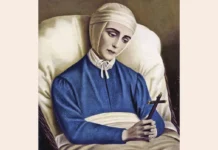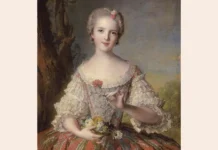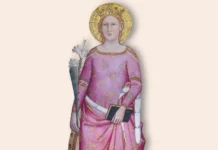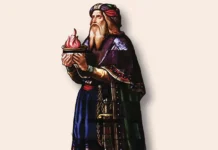A man of ardent charity, he heeded the divine call to be a missionary with humility and grandeur, boldly confronting onerous circumstances for the good of souls and the glory of God.
“Although Father Joseph Xifre, Superior of the Missionary Sons of the Heart of Mary, has frequently spoken and written to request that I write a biography of my insignificant self, I have heretofore always excused myself. I would not have agreed to do so even now had I not been ordered to. Thus I am doing this only out of obedience, and out of obedience I am going to reveal several things that I would rather have left unknown. At any rate, may it all be for the greater glory of God and my sweet mother Mary and for the embarrassment of this poor sinner.”1
Beginning his Autobiography with these words, St. Anthony Mary Claret made it clear that he would tell of God’s action in his life solely out of obedience to the voice of the Superior General of the order… which he himself had founded! Such is the power of holy obedience, even for the founder! His confessor affirms, however: “Whoever knew the Servant of God as I knew him would easily perceive, in reading his aforementioned account, that he said the bare minimum, undoubtedly to fulfil the precept of obedience imposed upon him without compromising his deep humility.”2 Notwithstanding, a life marked by grandeur and humility is registered for history, and his pen reveals the beautiful harmonic contrasts of an extraordinary man whose life spanned most of the nineteenth century, filled with fruitful and memorable episodes.
Meditating on eternity: seed of the missionary
Born into a deeply religious family, the Saint relates of his early childhood: “Divine Providence has always watched over me in a special way.”3 It is interesting to note that, in reference to his origins, he mentions the tiny Sallent, in the Diocese of Vich, province of Barcelona, where he was born, as well as his parents, Juan Claret and Josephine Clara—whom he describes as “upright, and God-fearing people, very devoted to the Blessed Sacrament and Mary Most Holy”4 —, but not the date of his birth. He records only that of his Baptism: December 25, 1807.
His first recollections date back to when he was five years old. Having received from his parents the first notions of good and evil, Heaven and hell, he began to ponder eternity during nights of insomnia: “‘forever, forever, forever.’ I would try to imagine enormous distances and pile still more distances on these and realize that they would never come to an end. Then I would shudder and ask myself if those who were so unhappy as to go to an eternity of pain would ever see an end to their suffering. Would they have to go on suffering? Yes, forever and forever they will have to bear their pain!”5 And he was moved with compassion to the depths of his soul.
This thought was the driving force, “the mainspring and goad of my zeal for the salvation of souls,”6 for his apostolate aimed at “converting sinners, in preaching, in hearing confessions, in writing books, in distributing holy cards and pamphlets, and in having familiar conversations.”7 For “the thought of the ease with which people sin—as if it were like taking a glass of water, as if it were something funny or amusing—the thought of the crowds that stay continuously in mortal sin and are thus on the road to death and hell; this thought robs me of rest, and I feel like running and crying out.”8 His concern for the salvation of souls was soon joined to zeal for the glory of God: “If sin is infinitely malicious, then preventing a sin is preventing an infinite offence against my God, against my good Father.”9
The awakening of a priestly vocation
As a boy, he was enrolled in school, where he received his elementary education. Lively and intelligent, he took well to his studies, especially catechism and sacred history. At ten years of age he made his First Communion and, from then on, always frequented the Sacraments. The priestly vocation was awakened early in young Anthony: “With great faith, trust, and love, I would speak to God, my good Father. I offered myself a thousand times to His sacred service; I desired to be a priest, to consecrate myself, day and night, to His ministry”10
He was sent to study Latin, but the course closed some years later and difficult times obliged his father to bring him to work in his small wool and textile shop, instead of sending him to the seminary.
Business or the priesthood?
Anthony was in charge of filling the spools on the weaver’s shuttle. Later on, he became director of operations, and in this office he learned how true it is “that much more may be gained by kindness than by harshness and irritability.”11
However, he considers this phase of his life as a period of tepidity, for he threw himself wholeheartedly into the trade, exchanging his vocation for machines, designs and warps. In 1825, he set out for Barcelona to refine his art as a weaver. Self-taught, by simply analyzing samples of fabrics from Paris and London, he ably devised methods for producing identical or better results. For three years, these matters occupied his mind to the point that, even during Mass, there were “more machines in my head than saints on the altar.”12
But a moment came, when, like an arrow piercing his heart, he recalled this Gospel passage during Mass: “What does it profit a man if he gain the whole world and suffer the loss of his soul?” (Mk 8:36). “I was like Saul on the road to Damascus […]. The warmth of devotion and piety reawakened in me.”13

From Carthusian to Jesuit…
He decided to flee from the world and become a Carthusian monk, much to the chagrin of his father, who had pinned his entrepreneurial hopes on his son’s talent. Anthony returned to Vich and began philosophy studies, developing a taste for contemplation, discipline, and penance. What had happened to his desire to be an apostle and save souls? God’s ways are not man’s ways…
On the way to the Carthusian monastery of Monte Alegre near Barcelona, he became gravely ill and had to return to Vich. Then he understood that the call to the contemplative life had been circumstantial: “The Lord had been calling me away so that I would come to detest the things of the world and, once detached from them, might remain in the clerical state.”14
Finally, he entered the seminary and, having completed his studies, was ordained a priest on June 13 of 1835. He was sent to St. Mary’s Parish in his native town, and there he established a rigorous rule of life for himself. But God was urging him to be a missionary. “In many passages of the Bible I felt the voice of God calling me to go forth and preach. The same thing happened to me while I was at prayer. Thus it was that I determined to leave the parish and go to Rome, to present myself to the Congregation for the Propagation of the Faith so that they could send me anywhere in the world.”15
When he arrived there, Cardinal Giacomo Filipo Fransoni, Prefect of the Congregation, was travelling. Fr. Claret took advantage of the wait to take part in the Spiritual Exercises of St. Ignatius of Loyola with the Jesuits. Upon completing them, he revealed the dispositions of his soul to the priest director, who invited him to enter the Company of Jesus: “I found myself a Jesuit overnight.”16
…from novice to missionary and founder
The novitiate period was highly beneficial: “It was there that I learned how to give the Spiritual Exercises of St. Ignatius, and methods for preaching, catechizing, hearing Confessions usefully and effectively.”17
He felt content in the Company of Jesus, but a leg problem led him to the infirmary and no cure could be found. The superiors saw this as a supernatural sign that God was calling him elsewhere; they decided he should return to Spain, and encouraged him to follow, in fact, the path of the missions.
Bishop Luciano Casadevall of Vich sent him to the mountain village of Viladrau, where he began his work of winning souls for Heaven. He would only go where he was sent. As he counselled his missionaries: “As far as any possible difficulties or persecutions are concerned, let them have no fear: God has sent them through obedience and He will take care of them.”18 Like the Apostles, he proudly proclaimed the Gospel, drove out demons and cured many sick people.
Returning from an evangelizing trip to the Canary Islands in May of 1849, he undertook a plan to which he had given long and careful thought, of founding a congregation of missionary priests. In it, each member should be “a man on fire with love, who spreads its flames wherever he goes. He desires mightily and strives by all means possible to set the world on fire with God’s love. Nothing daunts him; he delights in privations, welcomes work, embraces sacrifices, smiles at slander, and rejoices in suffering. His only concern is how he can best follow Jesus Christ and imitate Him in working, suffering, and striving constantly and single-mindedly for the greater glory of God and the salvation of souls.”19
Gathering five other priests in the seminary of Vich, and with episcopal authorization, he founded the Congregation of Missionary Sons of the Immaculate Heart of Mary on July 16 of that year. “Today we begin a great work,”20 he affirmed.
However, less than a month later, the Bishop summoned him and handed him a letter appointing him as Archbishop of Santiago de Cuba…
In the Archdiocese of Cuba: loved and persecuted
Alleging that he could not abandon the religious library that he directed, as well as the newly founded congregation, he declined. But when he received a formal order from his prelate, he entrusted the small community to Mary Most Holy and, after Episcopal ordination, departed for Barcelona, from which he would cross the Atlantic to reach his Archdiocese.
The limitations of space prevent a recounting of the adventures of that voyage, in which each stop served as a pretext to preach; nor would it be possible to relate all that the Saint faced in the former Pearl of the Caribbean in terms of dangers, natural catastrophes, epidemics, missionary successes and setbacks. He introduced order at every turn, and the power of his word quelled revolts, moralized customs and obtained mass conversions. “During my six years and two months in office, I visited every parish in the diocese four times,”21 he wrote.
For all the good done there, St. Anthony Mary Claret personally felt the gratitude of those he helped—as well as hatred and persecution. He had already experienced this in Spain, but in Cuba the hostility was so intense that it almost led to his murder. Early in 1856, after concluding a fiery sermon, he left the church and was walking along the busy Calle Mayor of the city of Holguin, when he suffered a frightful attack. Under the guise of approaching to kiss his episcopal ring, an assailant attempted to slash his throat with a barber’s razor. At that precise moment, the Saint’s head was bent forward, and he had raised a handkerchief to his mouth. Consequently, the blade caught him across the face, from his ear to his chin, and along his right arm. “I can’t describe the pleasure, delight and joy I felt in my soul on realizing that I had reached the long desired goal of shedding my blood for the love of Jesus and Mary and of sealing the truths of the Gospel with the very blood of my veins,”22 was the reaction of the holy Bishop. With time, the deep wound healed, but his face remained noticeably disfigured, and he rejoiced to be able to say with St. Paul: “I bear on my body the marks of Jesus” (Gal 6:17).
Appointed confessor of Queen Isabel II, he left Havana for Madrid, in March of 1857. Finally, he was able to observe the progress of his congregation. He carried out his new office with integrity, without becoming involved in the intricate political questions of the day; but his salutary influence on the sovereign and on society provoked an onslaught of calumnies and persecutions, which climaxed in his exile to France.
Previously, he had been admired and even praised by the majority; with his banishment, he garnered the distain of public opinion: “all hate me and say that Fr. Claret is the worst man that has ever existed, and that I am the cause of all the evils of Spain,”23 he affirmed.

Aflame with charity
As a reward for such love of God, he was granted mystical favours, including the foretelling of future events, and the permanent Eucharistic presence: “On August 26, 1861, at 7:00 in the evening while I was at prayer in the church of the Rosary at La Granja, the Lord granted me the great grace of keeping the sacramental species intact within me and of having the Blessed Sacrament always present, day and night, in my breast. Because of this I must always be very recollected and inwardly devout. Furthermore I must pray and confront all the evils of Spain, as the Lord has told me.”24
Elderly, infirm, and weary, he still had stamina to attend the First Vatican Council, where he impressed the assembly with his speech in defence of papal infallibility. On October 24,1870, while returning to France, fleeing his persecutors and inflamed with charity, he gave up his soul to God in the Cistercian Abbey of Fontfroide.
This beautiful passage from an ardent prayer he composed in the Jesuit novitiate sums up the thirst for souls that consumed him during his entire life: “For how can I say that I love God if, seeing my neighbour in his plight, I do not come to his rescue? […] How can I have charity if, knowing that ravenous wolves are devouring my Master’s flock, I hold my peace? How can I have charity if I am silent at the theft of those most precious jewels that cost the lifeblood of a God, or at the sight of people setting fire to the house and heritage of my most loving Father? Ah, my Mother, I cannot still my voice on such occasions. No, I shall not be silent, even if I knew it meant that I should be cut to pieces […]. I shall not be silent, and when my voice is hoarse or mute from all my crying, I shall lift up my hands to Heaven, make my hair stand on end, and stamp my feet upon the ground to make up for my lack of speech. Therefore, my Mother, I shall start this moment to speak and cry out. I come to you, yes, to you, Mother of Mercy. Deign to offer me your aid in my great need. Never tell me that you cannot, for I know that in the order of God’s grace you are all-powerful. Grant all men, I beseech you, the grace of conversion, for without it we can do nothing; then send me and you shall see how they will be converted.”25 ◊
Notes







